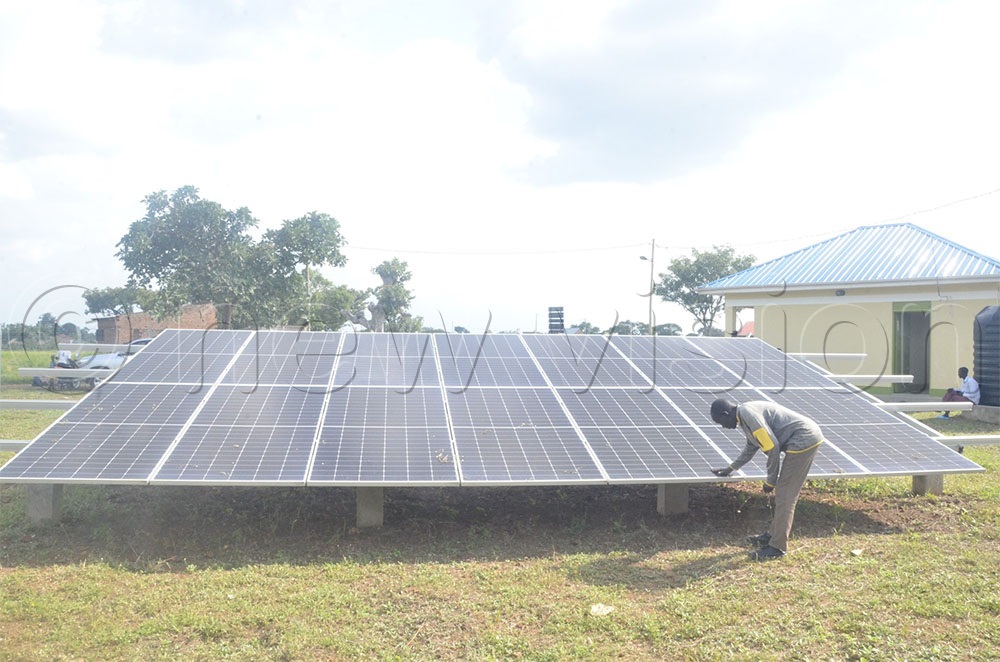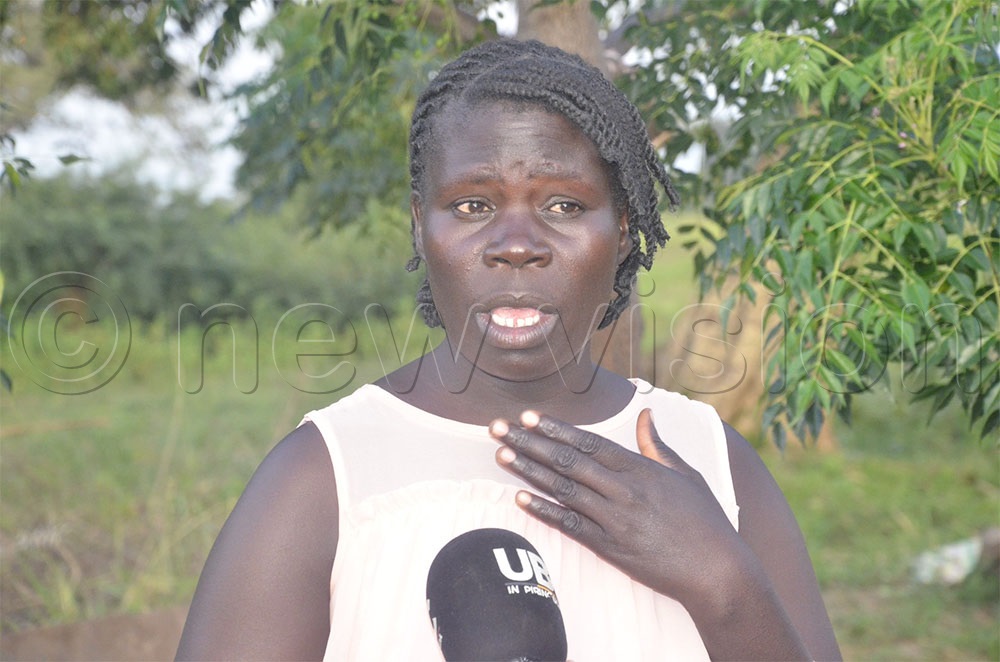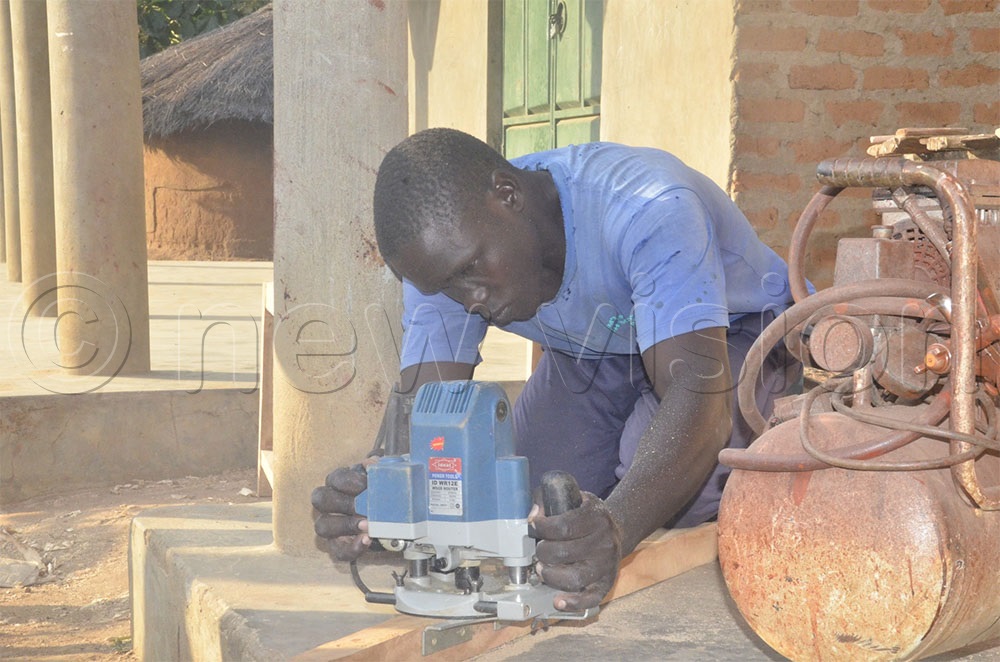Sh159b rural economic growth project illuminates rural Uganda
“Access to solar power has completely changed my life,” Tamiru said. “I now use clean energy appliances like a percolator, which has improved both my health and productivity.”
Simon Amodoi, the LEGS Solar technician, demonstrates how the solar mini-grid converts sunlight into electricity. This was during the visit of technical staff and officials of the local government ministry to the Kanapa Solar mini grid at Magoro sub-county in Katakwi district last week. (Credit: John Masaba)
KATAKWI - The Government has received commendations for the Shillings 159 billion ($43 million) Local Economic Growth Support (LEGS) Project, which is transforming lives in rural Uganda through the delivery of clean energy, creation of jobs, and community empowerment, particularly for women and youth, amid the growing threat of climate change.
Funded by the Islamic Development Bank (IsDB) and the Lives and Livelihoods Fund (LLF), the LEGS project is led by the local government ministry and is currently active in 17 districts.
A two-day field visit last week by technical staff and local government officials to Katakwi district showcased the project's progress and impact. The insights gathered are expected to influence Phase II of the initiative, which aims to expand its reach to 55 districts.
Goretti Imalingat Tamiru, a mother, farmer, and climate change advocate from Tanaka Valley, shared how the project is helping reduce reliance on charcoal, a primary cause of deforestation in the region.
“Access to solar power has completely changed my life,” she said. “I now use clean energy appliances like a percolator, which has improved both my health and productivity.”
A man demonstrates how to clean solar panels to enhance their efficiency during a recent visit by technical staff and officials from the local government ministry to the Kanapa Solar mini grid in Magoro Sub-county, Katakwi District. (Credit: John Masaba)
She credits solar power with enabling her to pursue an online master’s degree at John Morris University in Liverpool. With reliable electricity, she now attends virtual classes, makes global presentations, including to the African Development Bank, and was recently nominated for a climate justice training programme in Germany.
“The power units cost just shillings 800, and a power bundle goes for shillings 5,000—affordable even for low-income families,” she added. “This is life-changing for rural women like me, who used to spend hours gathering firewood.”
Charles Epu, who donated land for the solar grid in Kanapa, remarked that electricity has brought services closer and spurred business growth.
“People used to travel to Soroti for services like welding. Now they are available right here: Cheaper, faster and safer,” he said.
Since the grid was activated, entrepreneurship has flourished, with new salons, tailoring shops, welding workshops, juice vendors, and food stalls emerging. Diesel-powered grain mills are being replaced by cleaner, electric alternatives—reducing costs and improving efficiency.
Vincent Ilemut, chairperson of the Kanapa Solar Power Mini-Grid Association, noted the remarkable transformation the village has undergone in just nine months.
Grocery shops have increased from two to seven, restaurants from one to three, and the number of salons has risen to eight. A new bakery now supplies fresh bread locally, eliminating the need to travel to distant towns.

Goretti Imalingat, an online student pursuing a master’s degree at John Morris University in Liverpool, said that a stable power supply has greatly improved her ability to attend virtual classes, deliver online presentations, and avoid interruptions caused by outages or device shutdowns. (Credit: John Masaba)
“As a result, land prices have soared from shillings three million to 4.5 million per plot, with projections to reach six million by the end of the year,” he added.
Joyce Akol, who previously brewed waragi, has shifted to a more sustainable venture. After receiving training in Soroti, she invested in a refrigerator and blender and now runs a juice and yogurt business.
“Without the LEGS Project, my children might have ended up in fishing,” she said.
Challenges remain
Despite the successes, residents express the need for further support to enhance the project's impact. Imalingat urged the Government to provide individual power meters to avoid conflicts among households sharing meters.
“Some people use heavy machines while others use only light appliances, but everyone is expected to pay the same amount,” she said. “This causes disputes. If each household had its own meter, it would save us from unnecessary quarrels.”
According to project officials, the meters are procured with funds collected from beneficiaries, but their high cost has limited availability.
Epu called for improved water access and additional security lighting, noting that the village currently has only one borehole and six to seven security lights.
“We hope continued support will help us extend electricity to neighbouring villages like Koikong and Opeta, improve water access, and install more security lights to enhance safety,” he stated.
Residents also requested more solar panels and batteries to expand the grid’s capacity. Out of 896 households, only 36 are currently connected to the mini-grid.
“If more panels and batteries are added, we can serve the entire population of 1,119,” said one resident. “We believe in the government’s efforts to achieve the Sustainable Development Goals, and we want to ensure no one is left behind.”

Matthew Ariko, a carpenter working in Magoro with an electric-powered timber moulding machine, shared that the income from his workshop has allowed him to support his young family, describing the development as a milestone in his life. (Credit: John Masaba)
Expanding impact
Katakwi chief administrative officer (CAO) Alex Felix Majeme said the solar mini-grid in Kanapa now supplies clean and reliable electricity to over 1,119 people in remote areas. He described it as a significant milestone in bridging the rural energy gap.
“The LEGS Project is not just about electricity,” Majeme emphasized. “It’s about sustainable development, education, health and empowering entire communities.”
He highlighted major improvements in water and sanitation, including a Sh490 million investment in a water supply scheme at Orungo Rural Growth Centre.
About LEGS project
LEGS aims to reduce poverty and improve the livelihoods of vulnerable Ugandans by enhancing access to clean energy, safe water, agricultural infrastructure and income-generating opportunities.
The project operates under two main components across these 17 districts.
Component A: focuses on water for enhanced agricultural productivity and environmental conservation. It is being implemented in 10 districts: Alebtong, Bunyangabu, Kabarole, Kumi, Kibuku, Katakwi, Kyenjojo, Ntoroko, Gomba, and Nakaseke.
Component B: Implemented by the Microfinance Support Centre Ltd, supports value chain development and covers all 17 districts: Adjumani, Buyende, Tororo, Buikwe, Nwoya, Luwero, and Rukungiri, in addition to Alebtong, Bunyangabu, Kabarole, Kumi, Kibuku, Katakwi, Kyenjojo, Ntoroko, Gomba, and Nakaseke.